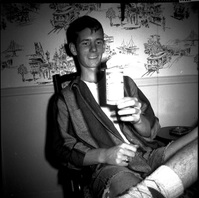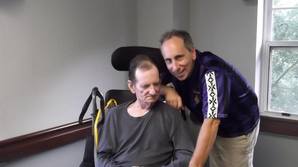 DBC Sr., circa 1962. DBC Sr., circa 1962. David Bruce Collins, Sr., departed from this earthly plane yesterday at the age of 73. Had he made it to 9 November, he would have been 74, the same age at which his father died. But 73 is an appropriate age for an amateur radio operator to go: In ham-speak, "73" means "best regards," the way hams say farewell. Dad was born in Manhattan, 9 November 1941, and grew up in Bergen County, New Jersey. He graduated in from Tenafly High School in 1959, then went on to Oklahoma State University, one of the few schools offering a major in computer science at that time. He married my mother Susan Hendricks in early 1962, and I came along that November. He never did finish his degree, but he did eventually find employment in computers way before anybody knew what "information technology" was. I don't feel any great sadness at his passing. Instead, there is profound relief that his long suffering has ended. Just before his 70th birthday, Dad had a massive stroke, combined with a heart attack and a case of pneumonia. His sister Sheila Collins Bard found him unconscious, but miraculously alive, in the Cape Cod house they shared on 4.5 acres in Lyme, Connecticut. He was stabilized at Lawrence & Memorial Hospital in New London, the same hospital where my son Paxton was born in 1991. L&M then recommended placing him at Bride Brook Health and Rehabilitation Center in the nearby village of Niantic, East Lyme, Connecticut, where he lived for almost four years. Bride Brook gets a five-star rating from just about everybody. I don't have enough stars to bestow on the staff there, working with infirm seniors with every form of dementia imaginable, making Dad's last years bearable. Of course, I have to work The Earthworm into this post. On my last visit to Bride Brook this summer, I read the first few chapters of my freshly published novel aloud for Dad, and I had to stop because he was laughing so hard that he was in pain. (Your mileage may vary, as they say.) I left an autographed copy in the library there.  DBC Sr. & Jr. at Bride Brook in July 2012. DBC Sr. & Jr. at Bride Brook in July 2012. Between 2002 and 2011, Dad seldom left that house on Bill Hill Road. After his first stroke in 2002, he had a severe visual impairment and could not drive. But he had his extensive collection of two-way radio gear in the basement and a 50-foot transmission tower. He could talk to people all over the East Coast and, when atmospheric conditions were right, all over the world. One impressive possession of his was a QSL card from King Hussein of Jordan, an avid ham operator. My memories of Dad's life are a mixed bag, and I'm not the kind to suppress the bad ones just because he's gone. De mortuis nil nisi bonum is good wisdom, but advice to be taken cum grano salis. A psychiatric physician's assistant to whom I related my family history once surmised that my father suffered from borderline personality disorder. I replied that he didn't really have much personality to begin with, but that's apparently not a prerequisite. I dismissed it as an in absentia diagnosis at first, but later realized that she may have nailed it. Toward the end of that nine-year period between strokes, Dad made life miserable for my aunt and her family. He wasn't really all that pleasant to my half-brother Dan, his son by his second marriage; Dan's daughter Brianna was the light of his life, his one shining hope for the future. I never got to see Dad's darkest darkness, but Aunt Sheila and cousin Chris report that he would fly into rages without provocation. He kept two TV's on in different rooms, tuned to the same channel, blaring all day. He steadfastly and angrily quashed any talk of repairs or improvements on the house, which still desperately needs work. He managed to make a large sum of family money disappear, assuring that the needed repairs would never happen. I don't know all the details, and even if you drew me an illustrated map of what happened when, I probably still couldn't understand it all. In those same years, despite his difficulties with vision and mobility, we discovered that Dad was regularly hiking the three miles down Highway 156 to the A&P in Old Lyme to buy cigarettes (he was not supposed to smoke, but no doctor was going to tell him that) and peppermint candies by the pound, then hiking back up. Highway 156 is a curvy two-lane state road that parallels the neck of the Connecticut River. It has no sidewalks and only a narrow, gravel-strewn strip of shoulder. If anyone ever stopped to give him a lift, we never heard about it. But then, he looked pretty scary, shambling along zombie-like in his flannel overshirt, shaggy hair, and beard. Ah, the things we do and the chances we take to avoid dying of boredom. We were not close as close can be, Dad and I. My mother and I moved to Houston when I was three, following their divorce and her parents' move from North Jersey. Dad stayed there. I would fly up every summer for the two-month custodial visits. In 1969, he married his high school sweetheart, who was not so sweet, and bought a house in Saddle Brook from René, a friend and fellow ham. On weekdays, Dad would sleep late, put in eight hours at his friend Ray's computer services company, come home, eat dinner, grumble a lot, and watch TV until he passed out. I spent much more time in the company of my stepmother Marcia, her two children, and Tippy the border collie than with Dad. (Tippy was awesome in every way and did not have the canine OCD typical of the breed. Marcia would brush him, or scoop up the hair he left on the carpets, and run his hair through her spinning wheel to make yarn to knit sweaters.) There was also an older boy who lived across Saddle River Road, and some friends of his, who would come over and play Wiffle ball in the back yard, pretending to be the entire lineups of our favorite Major League teams. Weekends at least provided more Dad-time. The family might take a trip to Ray's lake house, or in later years visit Ray and his family at their place on Fire Island. Friday nights almost always involved driving the whole crew to Marcia's parents' house in Tenafly for dinner (usually steak). In my teen years, Dad took up his father's most beloved activity, tennis, and we would go to the courts on some summer evenings. He discovered that he loved the outdoors, especially the Ramapo Mountains of New York and New Jersey, and would take me canoeing and hiking. He found a group of outdoorsy friends for camping trips; he once admitted to me that he tried marijuana on one of those outings, but it never became a habit, unlike his unfiltered Camels. Dad also admitted that he was escaping from the home life that had made him increasingly uncomfortable. I completely understood that. The highlight of any custodial trip for me was the week or two I could spend with my grandparents in New England. There were two memorable road trips. The first was in the summer of 1976, when Bicentennial Fever gripped the nation. Dad and Grandpa drove in Dad's VW micro-bus from New Jersey to Lander, Wyoming, stopping at various places to visit friends and relatives. The trip yield an epic slide show. They picked me up in Oklahoma City, where we met up for a reunion of Grandpa's family, and where we all visited my 95-year-old great-grandmother for the last time before she died. On the trip back to Jersey, I mostly remember
In 1983, he picked me up in Chicagoland, at the home of Marcia's sister's family. I had been corresponding with my "twin cousin" Robin (actually my step-cousin), who was born five days before me. We saw some sights in downtown Chicago, including the Picasso sculpture and the observation deck in Sears Tower. Then we drove back in the 1971 Sedan de Ville that Grandpa had bought, along with an identical de Ville to scavenge for spare parts. I have vague memories of a hard rain dogging us as I drove the Cadillac through Pennsylvania. Dad found the time and money to fly to Houston for my high school and college graduation ceremonies. The night after I graduated from Rice University, we went to Goode Company Bar-B-Q with my then-girlfriend, and then he got to watch me do my brand of one-way radio at KTRU-FM. The last half of 1987 was a very odd and pivotal time in our family, as three generations moved in and out of the old house on Bill Hill.
By 1991, the worm had turned: oil was back up, Texas was on the rebound, and New England's economy was in the shitter. My wife, our new son, and I moved to Houston, which is an entirely different set of stories. I'm fairly sure that Dad resented my absconding with his first and only grandson, but he never mentioned it. Thank you, Dad, for all the enjoyment, the hard life lessons, and the years of child-support checks. You were a crotchety old bastard, but I love you. Now get your rest.
Peter Adely
22/1/2018 16:47:00
Hi. Grew up with your dad. I lived over border in Bergenfield. Met you and was in your home many times. I knew Marsha and her Father Clarke. We were both Hams. He was K2DIG and I was K2MHP. Now W2HP. Was also at rene's home. Lots of memories. Talked to your Dad from Iceland when he worked for Ray. memories. RIP
dbc
22/1/2018 17:13:37
Thank you for your kind words, Mr. Adely. I was just thinking about this post the other day, remembering that I led with "73" but oddly forgot to include his call. For most of his life, Dave Sr. was K2LME, and (if I recall correctly) his friend Frank Kennedy was K2TTI.
Peter adely
22/1/2018 17:53:41
I lived 3 blocks from Frank we went to Bergenfield HS together. He died 3 years ago. I knew Marcia and her father. He picked me up in his ? Sunbean car. Clarke was a active Ham also. Dave’s friend Bill Dunkerley was my best man in 1963. Small world.
Bill, WA2INB
26/1/2018 22:27:17
David, it was nice talking with you tonight and getting reacquainted after all these years. I just learned of your dad's passing a week ago and felt very saddened. He and your mom were great friends of mine when we all lived in New Jersey. Dave's leadership contributed a lot to the success of the East Coast VHF Society and its acclaimed work in the Oscar satellite program with the WA2WEB ground station. The end phase of his life must have been very hard on him given the physical condition that beset him. I agree with your observation that his passing was in many ways a blessing. All the best to you and your family. --Bill, WA2INB Comments are closed.
|
Blogging Sporadically since 2014Here you will find political campaign-related entries, as well as some about my literature, Houston underground arts, peace & justice, urban cycling, soccer, alt-religion, and other topics. Categories
All
Archives
April 2023
|
 RSS Feed
RSS Feed